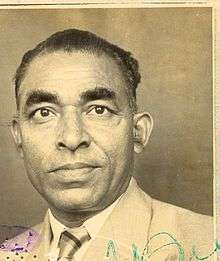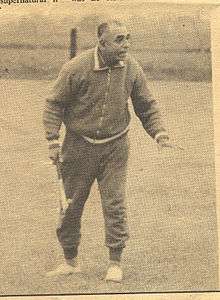Kishan Lal
 | |||||||||||||||
| Personal information | |||||||||||||||
|---|---|---|---|---|---|---|---|---|---|---|---|---|---|---|---|
| Born |
2 February 1917 Mhow, Central India Agency, British India | ||||||||||||||
| Died |
23 June 1980 (aged 63) Madras, Tamil Nadu, India | ||||||||||||||
| Playing position | Halfback | ||||||||||||||
| Senior career | |||||||||||||||
| Years | Team | Apps | (Gls) | ||||||||||||
| Indian Railways | |||||||||||||||
| Central India | |||||||||||||||
| National team | |||||||||||||||
| India | |||||||||||||||
Medal record
| |||||||||||||||
Kishan Lal (2 February 1917 – 23 June 1980) was an Indian field hockey player. He captained the Indian hockey team in 1948, which won its first gold at the Olympics as an independent country, defeating Great Britain in the final, 4-0. He was the greatest right winger in the history of hockey. He was instrumental in developing the Indian Railways hockey team as one of the best teams in India. A large number of players went on to play for India. He died on 23 June 1980 at Madras.
Introduction
Kishan Lal was India's captain of the hockey team at the 1948 Olympics in London. He was one of the greatest inside forwards in hockey. He is known as the fastest player in wing position He would race down to the goal position once the ball was with him, a thorn in the eyes of the opponent and was a gentleman player. According to Gian Singh, "Many times, I would think he would score but invariable he would pass the ball to inside forwards or the centre forward to do the finishing touch". When S S Naqvi, hockey coach in Oman and technical adviser with the Oman Olympic Committee gave his pick of players for a greatest ever World XI hockey team, he placed Kishan Lal of India as his first choice as a right winger.
Career
The beginning
He was born in Mhow. As a little child he was fascinated by games of polo which he used to often watch longingly. It triggered the player in him and soon he won the admiration of the crowds when he started playing at the age of 14 yrs. In 1933 at the age of 16 he represented Mhow Heroes, Mhow Green Walls and also went on to play for Kalyanmal Mills, Indore. He played along with Dhyan Chand for Jhansi Heroes. In 1937 his talent caught the eye of Mr. M. N. Zutshi the Captain of Bhagwant Club Hockey Team and it was brought to the attention of the Maharaja Bir Singh Ju Dev of the erstwhile Tikamgarh State and thereafter he was seen donning the colors of the prestigious Bhagwant Club of Tikamgarh.
In the year 1941 he joined the then BB & CI Railway now known as Western Railway. He played for Central India in the National Hockey Championship. He continued to figure prominently in the winning teams at the Agha Khan Cup, Beighton Cup, Obaidullah Khan Cup and the Scindia Cup Tournaments. Under his Captaincy the team won three times in a row.
Indian Hockey Team
In 1947, he wore the Indian colors while being chosen second in command to Dhyan Chand on a tour of East Africa and in the following year earned the honor of captaining the Indian team to the Olympic Games at London. This particular Olympic Games was very important to the country. India had just got her Independence from the British after a very long and demanding struggle. The 1948 Olympics was being held in London itself and India had been partitioned to carve out Pakistan on account of which most of the talented players had migrated to Pakistan. The Indian Team for the London Games was an all new team without a single player with previous experience of the Olympics. However, this Team led by Kishan Lal, set aside all apprehensions when they beat Austria 8-0, Argentina 9-1, Spain 2-0, Holland 2-1 and in the finals, brought glory to India by beating Great Britain 4-0 in its own backyard and asserted its hockey supremacy to the world. It was a moment India will never forget. This victory had brought great honor to the country because India had for the first time participated in these Games as an independent nation and for the first time, the Indian Tri-Color was unfurled in the Olympic arena and National Anthem 'Jana, Gana, Mana' was played.
India’s record at the 1948 Olympics
Played : 5
Won : 5
Goals For : 25
Goals Against : 2
Members of the 1948 Olympic Hockey Team

- Kishan Lal (captain)
- Kunwar Digvijay Singh (Babu) (vice captain)
- Leslie Claudius
- Walter D'Souza
- Keshav Dutt
- Lawrie Fernandes
- Ranganathan Francis
- Randhir Singh Gentle
- Gerry Glackan
- Akhtar Hussain
- Patrick Jansen
- Amir Kumar
- Leo Pinto
- Jaswant Singh Rajput
- Latif-ur-Rehman
- Reginald Rodrigues
- Balbir Singh
- Grahanandan Singh
- Trilochan Singh
- Maxie Vaz
Related anectode
The victorious captain Kishan Lal fulfilled a childhood boast when he dined with King George. As a schoolboy in Mhow, Kishan Lal had upbraided a sweets vendor for allowing flies to settle on his wares. The haughty hawker snapped back: 'Who do you think you are? The son of a nawab(King)? Do you dine with princes and rajahs?' Kishan retorted: 'Don't be so smart. One day, I'll dine with the King of England.' Kishan Lal, the finest outside-right that India has ever produced, did dine with the British monarch at a formal banquet. After the victory, V. K. Krishna Menon, free India's first High Commissioner to England, gave an official reception at India House. The victorious Indian team went on a goodwill tour of the European mainland - visiting France, Czechoslovakia and Switzerland. The team returned by ship to Bombay, where a red carpet welcome was given to the team. The victory celebrations culminated in Delhi, where President Rajendra Prasad and Prime Minister Jawaharlal Nehru attended a match involving the Olympic team at the jam packed National Stadium.
Coaching Days
After 28 years of continuous play, he retired from competitive hockey but remained connected with the game till 1976 as chief coach under the Railways Sports Control Board. Players like Balbir Singh, Harbinder Singh, Prithipal Singh and Mohinder Singh owe their stature in a big way to his grooming. His talent spotting was admired greatly. In 1964, he was invited to train Malaysia. In 1968, he was invited to coach East Germany. Even after retiring from Western Railway in 1976, he displayed great interest in the Railway Team and in the game. He was probably the only former Olympian who was a regular at Hockey Competitions.
Death
Hockey circles were plunged in grief when "Dada", as he was fondly addressed, died on 22 June 1980. He was in Madras as an invitee for the Murruguppa Gold Cup Hockey Tournament and was to be the expert commentator for the Doordarshan coverage of the second leg final scheduled for the very day. The Western Railway players and officials and all other hockey players and hockey Associations all over the country gave the departed Hockey star the honors that was due to him in their own touching ways. On 23 June 1980, touching scenes were witnessed at his residence in Bombay as sportsmen, officials of various organizations and sports writers paid their last respects to him. He was cremated at the Sion Crematorium in Bombay. There was a regular flow of Sports fans since 22 June at his place where his body lay after being flown down from Madras. The most moving sight was that of the Muruguppa Gold Cup Hockey Tournament Secretary Mr K.R Subramaniam who accompanied the body from Madras To what extent Madras respected the former star was evident when Mr K R Subramanian and Mr Reddy laid the garlands on the body of the deceased. Mr K R Subramanian said about "Dada" that he was amongst the most respected sportsman in the country, that he was a regular invitee to the Murruguppa Tournament since the last 7years. Former president of the IHF, MAM Ramaswamy expressed great shock and described him as one of the finest gentlemen he had come across. He said his death is a great loss to Indian Hockey, particularly as a coach and that he produced good players for the Railways. Former Olympian R S Gentle, on his death said "besides being the greatest right winger I have ever seen, he was a gentleman player and a coach of outstanding merit". Gurbux Singh, another Olympian said "Railways in particular have been orphaned". Joe Antic said "there will never be another". Similar sentiments were expressed by leading officials including the Bombay Hockey Association President, Mr Baptist D’Souza and the President of the Maharashtra State Olympic Association, Mr Magan Singh.
Honours
In 1966, he was awarded the prestigious Padma Shri by the then President of India Dr Sarvapalli Radha Krishnan.
Personal life
Kishan Lal had four sons and a daughter. His widow, now 83 years old, lives in the family home in MHOW, Madhya Pradesh, India with her youngest son. The eldest son Devki Lal was a hockey Coach who died on 21 September 2009.
See also
- List of Indian hockey captains in Olympics
- Field hockey in India
- India men's national field hockey team
References
- Bharatiya Hockey
- Misc magazine articles
- Misc newspaper articles
| ||||||